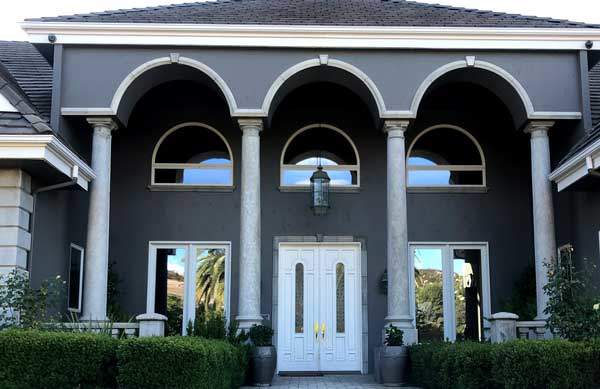Top Advantages of Putting Up Residential Window Tint for Your Residential property
Top Advantages of Putting Up Residential Window Tint for Your Residential property
Blog Article
Exactly How Residential Window Tinting Improves Your Home's Energy Performance
Residential home window tinting presents a compelling option for home owners looking for to improve power performance within their living rooms. By applying specialized movies to windows, it successfully lowers warm transfer, therefore supporting interior temperature levels and minimizing the requirement for too much heating or cooling.
Recognizing Home Window Tinting
Understanding window tinting is important for homeowners looking for to boost both comfort and power effectiveness in their home. Residential Window Tint. Window tinting entails the application of a slim film to the interior or exterior surface area of glass home windows. This movie can considerably regulate the amount of sunshine and warmth that gets in a home, hence influencing interior climate conditions
There are numerous kinds of home window tinting films available, each with distinctive buildings. The effectiveness of window tinting is commonly measured by its Visible Light Transmission (VLT) percentage, which indicates exactly how much light can pass with the movie.
Advantages of Power Efficiency
Window tinting not just improves looks yet likewise plays a substantial role in improving energy performance within residential areas. By lowering heat transfer with home windows, colored movies create an extra stable interior environment, which can lead to considerable decreases in energy intake for heating & cooling. This energy efficiency equates into reduced utility expenses, giving homeowners with significant long-term savings.

Furthermore, home window tinting improves the comfort of living rooms. By lessening glow and blocking dangerous UV rays, tinted home windows develop a more pleasurable setting, which can cause improved health for residents. The defense versus UV rays likewise helps maintain furniture and flooring from fading, adding to the longevity of house products.
Exactly How Tinting Functions
Tinting films operate through a mix of innovative products and innovations made to control the quantity of solar power getting in a home. Mainly made up of polyester, these films usually incorporate metallic or ceramic particles that absorb and reflect warmth. This double ability allows them to significantly reduce the infiltration of ultraviolet (UV) rays and infrared radiation while allowing noticeable light to pass through.
The performance of window tinting is measured by its solar warmth gain coefficient (SHGC), which indicates just how much solar power is transferred with the window. Reduced SHGC values are preferable as they denote higher warmth denial. In addition, window tints can feature a variety of tones, permitting home owners to personalize their aesthetic choices while boosting energy efficiency.
In addition, these films work as a barrier, preventing warm loss throughout chillier months by mirroring interior warmth back into the space. This thermal insulation impact matches the air conditioning advantages gotten during warmer months, contributing to a balanced indoor climate year-round. By handling solar energy successfully, residential window tinting not only boosts comfort yet additionally plays a crucial role in lowering power usage and lowering utility costs.
Choosing the Right Color

There are numerous kinds of window movies offered, consisting of colored, metalized, and ceramic. Colored movies are affordable yet might have limited toughness. Metalized films provide far better warm denial however can interfere with electronic signals. Ceramic films offer superb warm control without jeopardizing visibility and are extremely sturdy, making them a prominent selection.
Visible light transmission (VLT) is one more vital element, as it indicates the quantity of all-natural light that can pass through the tinted glass. Homeowners need to pick a color with a VLT that complements their lighting choices while still giving adequate glare decrease.
In addition, analyzing the solar heat gain coefficient (SHGC) can assist figure out exactly how well a tint can block warm from sunshine. A lower SHGC suggests better warm control, ultimately improving power performance.
Setup and Upkeep Tips
Correct installation and upkeep are essential elements in optimizing the advantages of household home window tinting. To accomplish optimal results, it is advisable to you can try these out hire a certified specialist for installation. This guarantees that the color is used properly, avoiding air bubbles, creases, or imbalance that could compromise efficiency. Specialists likewise make use of specialized methods and devices, which can boost the toughness and efficiency of the tint.
Complying with installation, maintenance is necessary to prolong the life of the window film. It is advised to wait a minimum of 1 month before cleaning the tinted home windows to permit the sticky to treat completely. When cleaning, make use of a soft towel and a a fantastic read gentle, ammonia-free cleaner to prevent harming the film. Prevent rough products that might scrape the surface.
Dealing with these concerns quickly can prevent more damage and maintain energy effectiveness. By adhering to these setup and maintenance suggestions, home owners can guarantee their home window tinting continues to supply substantial energy savings and comfort for years to come.
Final Thought
In final thought, property window tinting serves as a reliable solution for boosting power performance within homes. By minimizing warmth transfer and obstructing hazardous UV rays, window films contribute to lower power intake and improved indoor convenience.
Window tinting entails the application of a thin film to the inside or outside surface of glass windows. By reducing warm transfer through windows, tinted movies produce an extra secure interior climate, which can lead to considerable reductions in energy intake for home heating and cooling.The performance of window tinting is measured by its solar warmth gain coefficient (SHGC), which find this indicates how much solar energy is transferred through the window. By taking care of solar energy successfully, domestic home window tinting not just enhances comfort yet likewise plays a crucial role in decreasing energy intake and reducing utility expenses.
By decreasing heat transfer and blocking hazardous UV rays, home window films contribute to lower power intake and improved indoor comfort.
Report this page